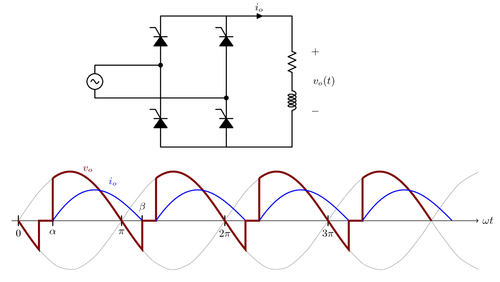
Edit and compile if you like:
% Power electronics---a controlled full-wave rectifier and
% it's output voltage and current waveforms.
% The delay angle \alpha is customizable.
% Author: Ali Mehrizi-Sani
\documentclass[landscape]{article}
\usepackage[usenames,dvipsnames]{color}
\usepackage[american,cuteinductors,smartlabels]{circuitikz}
\usepackage[active,tightpage]{preview}
\PreviewEnvironment{center}
\renewcommand{\PreviewBbAdjust}{-10pt -10pt 78pt 0pt}
\usetikzlibrary{calc}
\ctikzset{bipoles/thickness=1}
\ctikzset{bipoles/length=0.8cm}
\ctikzset{bipoles/diode/height=.375}
\ctikzset{bipoles/diode/width=.3}
\ctikzset{tripoles/thyristor/height=.8}
\ctikzset{tripoles/thyristor/width=1}
\ctikzset{bipoles/vsourceam/height/.initial=.7}
\ctikzset{bipoles/vsourceam/width/.initial=.7}
\tikzstyle{every node}=[font=\small]
\tikzstyle{every path}=[line width=0.8pt,line cap=round,line join=round]
\definecolor{AleeRed}{rgb}{0.5,0,0}
\begin{document}
\begin{center}
\begin{tikzpicture}
\draw
% Thyristors leg 2
(2,0)
to[Ty] ++(0,1.5)
-- ++(0,1)
to[Ty] ++(0,1.5) coordinate (leg2)
% Thyristors leg 1
(0,0)
to[Ty] ++(0,1.5)
-- ++(0,1)
to[Ty] ++(0,1.5) coordinate (leg1)
% Connections and load RL
-- ++(2,0)
to[short, i=$i_o$, current/distance=0.5] ++(2,0)
-- ++(0,-0.8)
to[R] ++(0,-1.2)
to[L] ++(0,-1.2)
% Back to (0,0)
|- (0,0)
% AC source
(-2,1.5) coordinate (Vnn)
to[sV] ++(0,1) coordinate (Vpp)
-- (leg1 |- Vpp) node [circ] {}
(Vnn)
-- (leg2 |- Vnn) node [circ] {}
% v_o(t)
(4.5,3.5)
to[open, v^=$v_o(t)$] ++(0,-3)
;
\end{tikzpicture}
\bigskip
% Example 4-7, p. 135 of Hart, discontinuous current in full-wave rect
\begin{tikzpicture}
\begin{scope}[xscale=1,yscale=1.5]
\newcommand{\alphaa}{60 * pi / 180}
\newcommand{\betaa}{216 * pi / 180}
\draw[thin, ->] (-0.2, 0) -- (14,0) node[right] {$\omega t$};
\foreach \x/\xtext in {0,{\alphaa}/\alpha,{pi}/\pi,
{\betaa}/~,{2*pi}/{2\pi},{3*pi}/{3\pi}}
\draw (\x,0.1) -- (\x,-0.1) node [below] {$\xtext$};
\draw (\betaa,-0.1) -- (\betaa,0.1) node [above] {$\beta$};
% Vs
\draw[domain=0:14, help lines, smooth]
plot (\x,{sin(\x r)});
% -Vs
\draw[domain=0:14, help lines, smooth]
plot (\x,{-sin(\x r)});
% Vo and Io
\foreach \qq [evaluate=\qq as \qqshft using \qq*pi] in {0,...,3}
{
\begin{scope}[xshift=\qqshft cm,
every path/.style={ultra thick, color=AleeRed}]
% Vo
\draw[domain=0:{\betaa-pi}]
plot (\x,{-sin(\x r)})
-- ({\betaa-pi},0)
-| (\alphaa,{sin(\alphaa r)})
[domain=\alphaa:pi]
plot (\x,{sin(\x r)});
% Io
\draw
[domain=\alphaa:\betaa,color=blue,thick]
plot (\x,{0.05 * (13.6*sin((\x - 0.646)*180/pi)
- 21.2*exp(-\x/0.754))});
\end{scope}
}
\node[right,color=AleeRed] at ({pi/2+pi/12},1.05) {$v_o$};
\node[right,color=blue] at ({pi/2+pi/3},0.8) {$i_o$};
\end{scope}
\end{tikzpicture}
\end{center}
\end{document} Click to download: power-electronics-rectifier.tex • power-electronics-rectifier.pdf
Open in Overleaf: power-electronics-rectifier.tex